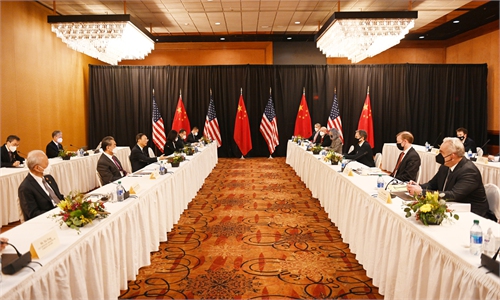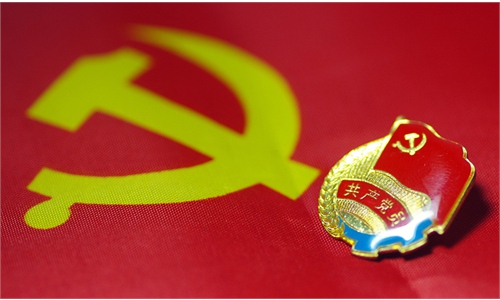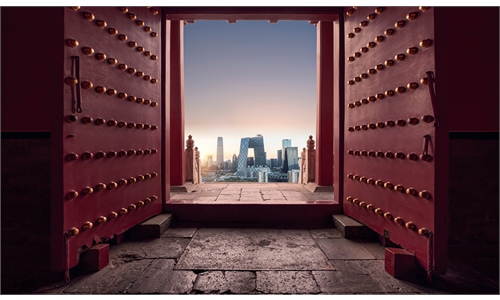Ability to renew itself and to deliver, and support from people make up dynamism of the CPC: Martin Jacques
Editor's Note
This year marks the 100th anniversary of the founding of the Communist Party of China (CPC). Over the past century, the CPC has led the Chinese people to prosperity. It did not collapse as many Western scholars once predicted. However, in recent years, the CPC has met increasingly hostile attacks from the West. Why did it happen? Where did the CPC's resilience come from? Global Times reporters Xie Wenting and Bai Yunyi (GT) interviewed Martin Jacques (Jacques) who until recently was a Senior Fellow at the Department of Politics and International Studies at Cambridge University.

Drones form patterns to mark the 100th anniversary of the Communist Party of China at Southwest China's Chongqing Municipality. Photo: IC
GT: Based on your observation, what are the differences between CPC officials and politicians from Western parties?
Jacques: I think they are rather different. It is a reflection of political systems. There are exceptions among British politicians both on the right and left, maybe particularly on the right, people really think about things in a serious way and have something interesting to say. But by large, I think the problem with a British politician is there's a lot of point-scoring. It's the sort of debating style. They'll never make a speech or rarely make a speech without criticizing the conservatives or the Labour party depending on where they come from. It's very tribal. The problem with tribalism is it's a serious barrier to thought.
I come from the left. By large, most Labour politicians don't think in strategic terms. They are very narrow-minded in their view. There are always exceptions. God saves exceptions, but they are relatively rare.
The other point I would make strongly is that for British politicians trade is words. It's all about words. It's all about speeches. It's all about what they say, not actually what they do because British politicians don't really do.
Before they come to the House of Commons and get elected, previously they might have been lawyers or in business. If they come from the right, maybe in the media; if they come from the left, they might come from a trade union association or in education. But they don't have any real experience of what running something is like. I think this is one of the great weaknesses of these kinds of political systems. The Americans have got, broadly speaking, the same problem, which is, it's all about getting elected. It's not about changing your society. They have an extremely short-term mentality.
GT: Many Western scholars had predicted the "collapse" of the CPC, and some had also predicted that the rule of the CPC in China won't last 70 years. But those predictions turned out to be wrong. What do you think is the thought process which resulted in Western scholars' predictions? Why hasn't the CPC collapsed as they predicted?
Jacques: I think that the reason they think like that is the normative view, which is that all political systems to be viable and sustainable need to be based on the Western model. In their view, the Western model should be universal. They'll go to great lengths to achieve this, such as, the regime change in Iraq, and impose on another country by force a system which is totally unsuitable for that society and culture. There is a very widespread view in the West that unless your political system is based on universal suffrage, a multiparty system, rule of law, and separation of powers, then your system is not democratic, unrepresentative, and unaccountable, therefore, it's unsustainable.
There's also a cold war reason, which goes back to 1970. The view was that Communist parties are instrumentalist, dictatorial, and authoritarian, and therefore, they don't enjoy the support of the people.
The first reason is persistent. The second, to some extent, comes and goes. The cold war factor came back with a real vengeance since 2016. We're back to a very cold war view of what a Communist Party is and the CPC is reduced to the Soviet Communist Party. We're back in the middle of the great regression, both intellectually and politically in the West.
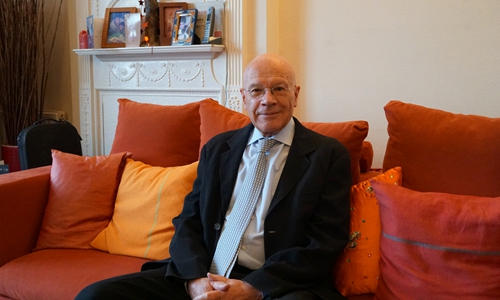
Martin Jacques Photo: Sun Wei in London/GT
GT: Where do you think the resilience of the CPC comes from?
Jacques: This is a very important question. It seems to me rarely asked in the West. They're always expecting its rule to end because they think it's unsustainable. So they never asked the question: how much time is elapsed now? Ever since 1949, the CPC has been ruling China. What is the source of resilience? They never asked this question except they would have an answer and they say coercion and some sort of brainwashing. Things like that would be their answer. My answer is completely different from that. I think that the CPC does enjoy the great support of people. And that is why it is managed to maintain its rule for so long.
And even when things didn't go so well, like towards the end of the Mao period, there was a low air, like the cultural evolution and so on. This was a low ebb in China. What is fascinating? The ability of the CPC to recuperate itself in that situation. Deng Xiaoping came along and he made really profound changes in the thinking of the policy. He introduced the idea of the market alongside state and planning as characteristics of Chinese socialism. He argued for integration that China should become part of the world. These really were huge shifts, which show you the ability of the CPC to renew itself and to renew China. They can make profound shifts when those shifts are necessary. This is extremely difficult for political parties to do anywhere in the world.
It wasn't because another party was elected. It is the CPC's ability to renew itself. I think it shows the deep roots of the CPC, which is very important.
The CPC is not like the Soviet Communist Party. The Soviet Communist Party did not have deep roots across Soviet society. The CPC does. The Soviet Communist Party represented a very small group, the working class. The CPC has really a deep root and represented the vast majority of the Chinese people. This speaks to the deep roots and also the self-confidence of the party and also the recognition that the party always has to earn its right. The government, in other words, has to deliver. These are some of the factors I think that make up the resilience of the CPC.
Let's look at the results. What the CPC has done since 1949 is an epic story. Now extreme poverty has been abolished. The living standards of the people have been transformed. China has been utterly transformed, China is no longer weak; China is very strong. It's now on par with the United States. Who isn't going to support the Chinese Communist Party under these circumstances?
GT: Some people claimed China has a one-party dictatorial system. What's your opinion?
Jacques: The standard criticism toward China is it doesn't provide choices because there's only one party: If there's no choice, there's no change, because you need competition between parties to provide this. My response to that is that's not true. Look at the example I gave earlier about the shift from Mao to Deng and the huge shift in policy. Look at the ability of the CPC to renew itself. It can't run China as it did 10 years ago or 20 years ago. It's constantly on the move. So this is a party which is capable of renewing itself in a very dynamic fashion.
I'm not to say that a one-party system is always the best. That is not true. There are a lot of examples that show that clearly. The Soviet Union is a classic example. But the Chinese case is very different. People should understand each system in its own context, historical context, and culture. I would suggest that actually, the CPC is much more creative and able to move and change than any Western political system since 1945.
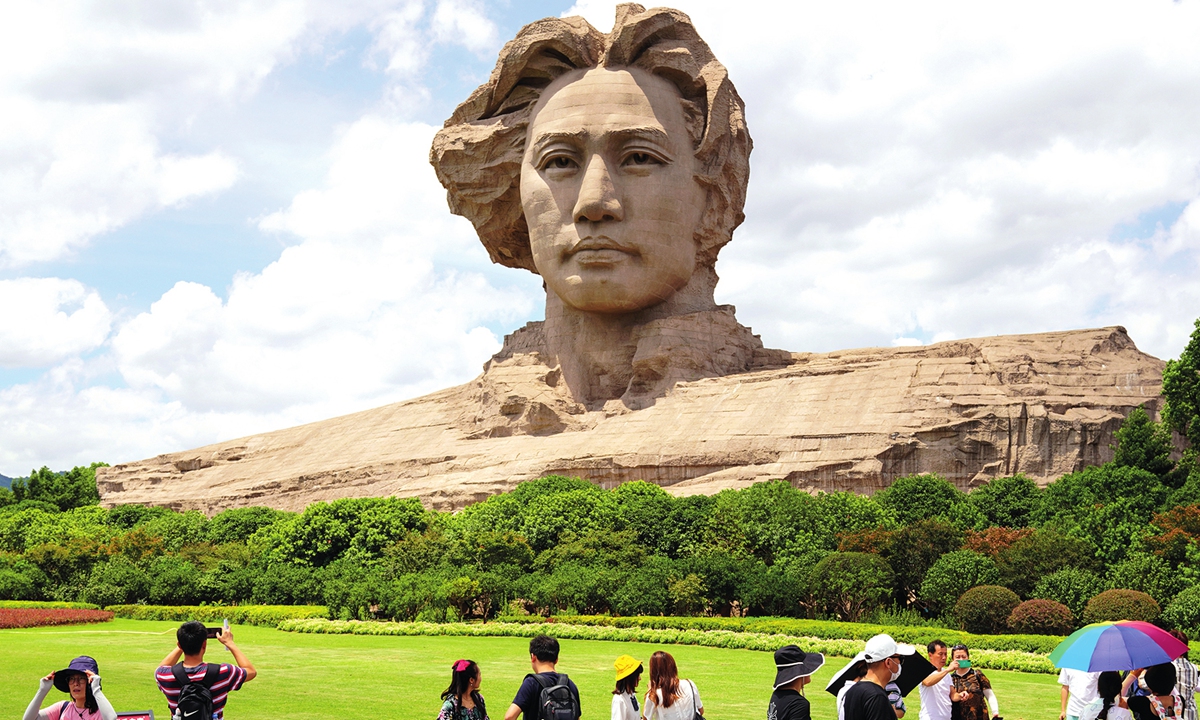
The monument of young Mao Zedong at Juzizhou Islet in Changsha, Central China's Hunan Province Photo: IC
GT: What do you think are the differences between the CPC and the Soviet Communist Party and other Communist parties that are considered "one-party dictatorships" in the West? Could you elaborate on this with your personal experiences and examples?
Jacques: I think what's happening in the West basically is an underlying assumption that the Soviet Communist Party and the CPC are basically the same. And what happened to the Soviet Communist Party will happen to the CPC. In other words, ultimately the Soviet Communist Party imploded. So the same thing will happen to the CPC. The problem with this way of thinking is that basically, it dramatizes and universalizes the term communist so that all communist parties are the same.
The problem with the Soviet Communist Party's support base was small and had little support from the countryside. I think, from the outset, the Soviet rule had a very strong authoritarian dimension to it. The Soviet Communist Party is not like the CPC that could enjoy popularity in the countryside.
The Soviet Communist Party was also incapable of reinventing itself. Its leadership got older and older, more and more inert, unable to move from a very dogmatic position until Gorbachev. When Gorbachev came along, of course, he got it all wrong. Probably it's because there was no culture of debate and argument.
China started off with economic reform. That's what Deng Xiaoping was absolutely right about. You've got to start with the economic reform. The Soviet Communist Party didn't. The fact was that from around the 1960s to the early 1970s, the Soviet Union's economic growth rate began to decline and was left behind further and further by the US. It made the catastrophic decision to compete militarily in the cold war with the United States, which it could not possibly afford to do. Eventually, the whole thing collapsed.
And so I think that the Soviet Communist Party is a warning to the CPC. They need to learn from it. Although I think they're very different, there were common factors historically in their relationship and so on. They came from the same period. But they are quite different.
The other problem in the Western view is just unfair. If you think the Soviet Communist Party is the same as the CPC, you must think therefore that Russia is the same as China. Anyone who knows anything about these two countries knows they are chalk and cheese and they are utterly different. In fact, Russia has much more in common with the West. Basically, Russia, ever since Peter the great has looked to the West, not to the East, transformed. This is completely different. The CPC has learned from the West. That is something that anyone who knows about China knows.
GT: You noted in a previous article that in the West, the debate about governance has been overwhelmingly organized around the principle of electoral democracy while in China state competence is the primary focus. How do you evaluate the difference between China and the West in this respect?
Jacques: I think that this is a very important factor here. The debate about governments in the West is about the way government is elected or selected. It's not about what the government does. How does it deliver? It's competence - achieving things.
There are two totally different debates. One is the Western debate, which is all about why haven't you got universal suffrage, a multiparty system? While in China the main emphasis is on the effectiveness of government. Is it able to deliver? And this is reflected in the whole way that the two political systems are organized.
In the West, the whole way in which politics is organized is around getting elected. And this, for example, leads to a very short-term mentality, because you've always got to get votes. I think it's a big problem in the West because it conspires against long-term thinking.
I think the Chinese system is very different. The Chinese system thinks very long term. It thinks in terms between congress, always thinking 10, 20, and 30 years, like the target for 2049. This is a culturally different way of thinking and much more, in my view, scientific, because most things take a long time.
The other problem is the kind of people who become politicians and political leaders. In the West, it's all about popularity, not the ability to deliver. So for the Western politician, typically their trade is in words, whereas in China, it's totally different. You're not going to become Secretary-General of the Communist Party of China unless you've already performed at many levels of governance and in the Party.
Frankly, I think part of the crisis of Western governments is around this question. China is basically far superior when it comes to delivery, long-term thinking, and conceiving about the future of society to the Western system. The Western system is not constructed for this kind of purpose. Therefore, it's no good at it.
I think there is a crisis of governance in the world, and it is not in China, it's in the West. How could it be in China? Look at China's success since 1979.
We know from all the opinion polls that the level of satisfaction in China toward the government is very high. But in America for example, it's much divided. You see that in the last election and so on. I think that Western governments will have to seriously reform, but it will take a long time.
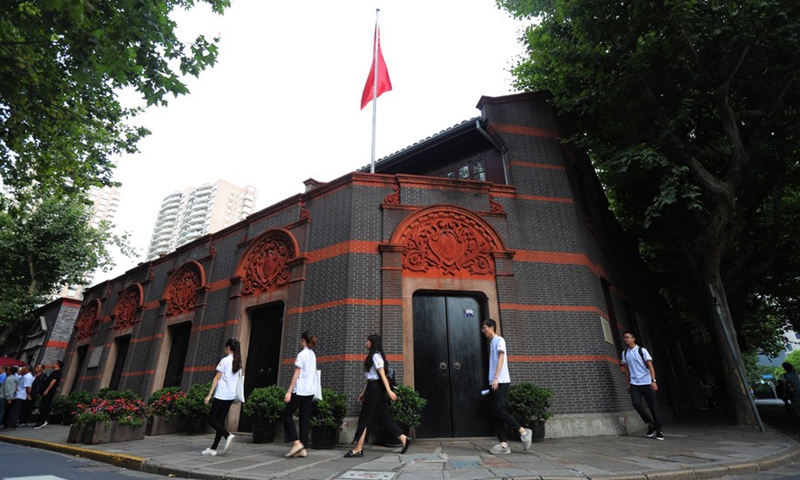
Volunteers from Shanghai University arrive at the site where the first Communist Party of China (CPC) National Congress was held in 1921, in Shanghai, east China, June 22, 2019. (File photo: Xinhua)
GT: From your point of view, what's the biggest misconception about the CPC in Western society?
Jacques: That it doesn't represent the people. They think that because there's no election it can't represent the people. I say it's much more representative of the people than any of the governments in the West at the moment and it's able to respond and deliver.
Look at the record and compare the record of Western governments and China over the last 40 years. That's the misconception because if they think the Chinese government or the CPC does not represent the people, then they must think it will fail.
I think that it was clear in terms of the levels of satisfaction, and the levels of participation, and the way in which society has been transformed. And all I think is these are the indicators. I'm not against elections. In general, I'm not someone who says about my own country or in the Western tradition you should just have a Chinese system. It would not work.
We've got such different traditions. The traditions and cultures are completely different. There's not a one size fit, so we got a complicated world with very different histories. You can't impose one on the other.
The Western mentality is based on the belief that the West is superior to everyone else; the West has run the world; it should run the world. The norms of the world should be Western norms. I'm sorry that era is over. It is over and it is not going to be resurrected. On the contrary, the West is in historical decline.
I don't think these people have got a clue to understanding the Chinese system. The thing is that the whole cold war mentality was so powerful and has never really disappeared. It became less influential but it has never disappeared and it got resurrected since 2016.
GT: In the last two years, the image of the CPC seems to have been greatly demonized in the West. Why do you think this has happened?
Jacques: I think the implication of this question is particularly what's been happening recently since Trump became the President of the United States in 2016. Because I think there was a relatively benign period between the late 1990s and 2015 when attitudes toward China in the West were more open and more inquiring. So what changed? I think what changed basically, the key here is America. America for a long time, from 1972 until 2016, had believed that it could have a cooperative, relatively benign relationship with China. It was based on two assumptions. One assumption was that it was inconceivable that China would ever become an economic challenger to the position of the United States.
The second assumption was that as a country modernizes, it Westernizes. In other words, China would become like a Western-style society. Now, as we can see, this was a supreme miscalculation on the part of the United States, because neither of those things happened. China is a really serious challenger to the US economically. And at the same time, there is no doubt at all that the Chinese governance is not weakened, but has grown in influence and support both domestically and internationally over this period.
So the result of this was around the period of 2016, there was a shift in American opinion. It began to see China, not in the old terms, but in the new terms of China as a threat. China is a threat to the global hegemony of the United States, and the United States believes that it has a God-given right to be number one in the world. And that really explains what happened. I think that is the fundamental reason why the attitude shifted.
Now it's kind of open season in the West for demonizing China. One lie flows into another. Now, we're in a period of serious regression. I think it's going to last quite a long time. But the resolution to it, I think, will be, at some point, the United States will have to recognize that it has to treat China as an equal in the world and it can no longer depend on and expect and require its primacy in the world. Once America comes to this view, which I think in the long run, it definitely will, then the conditions will exist for a different kind of relationship.
